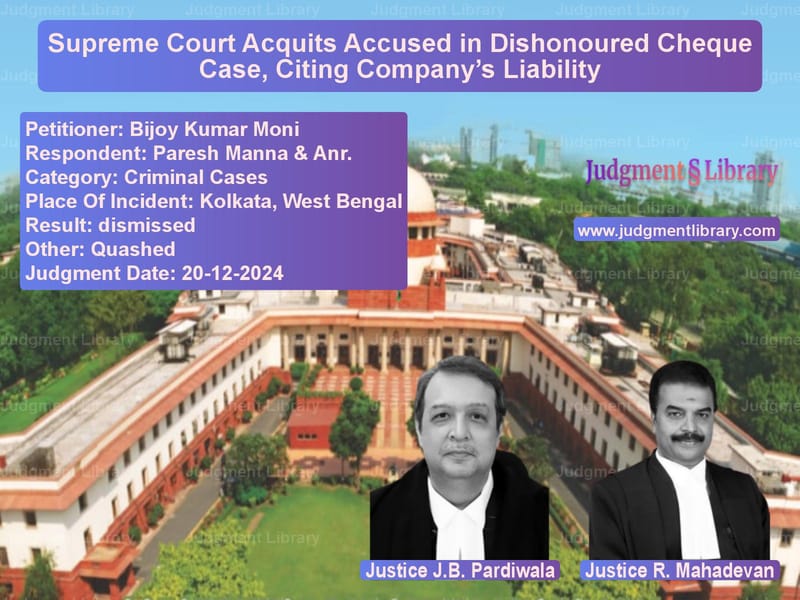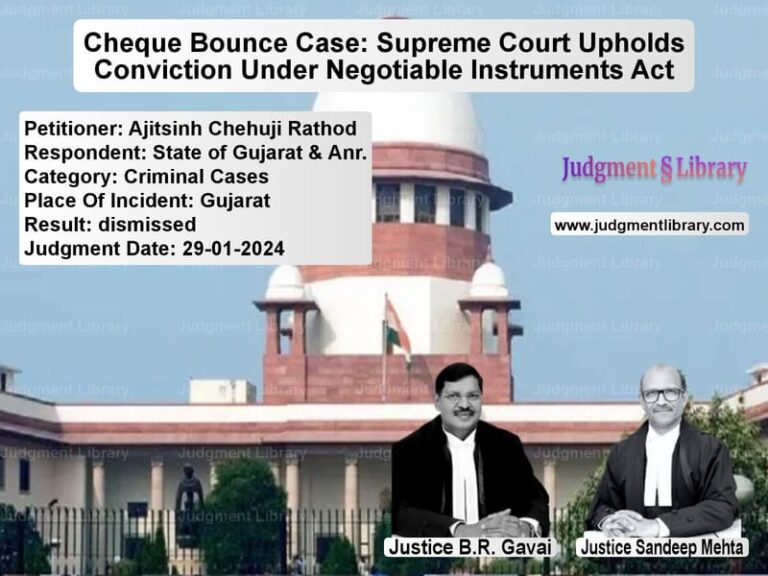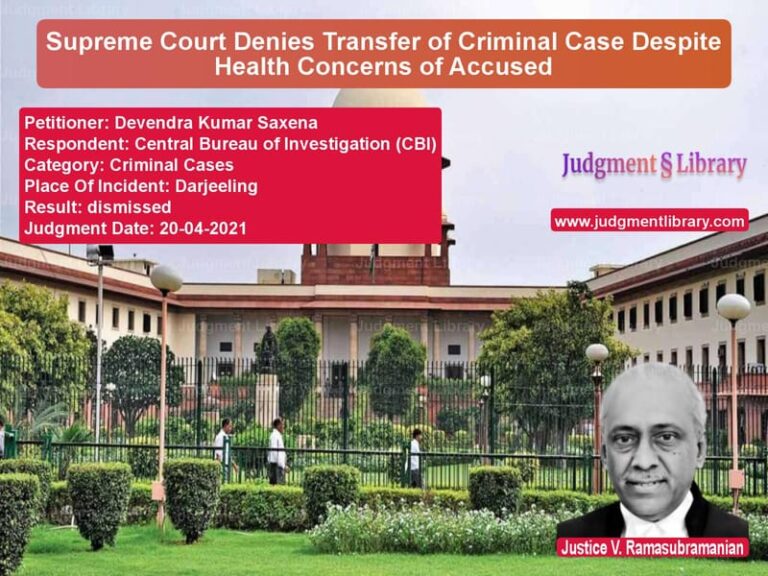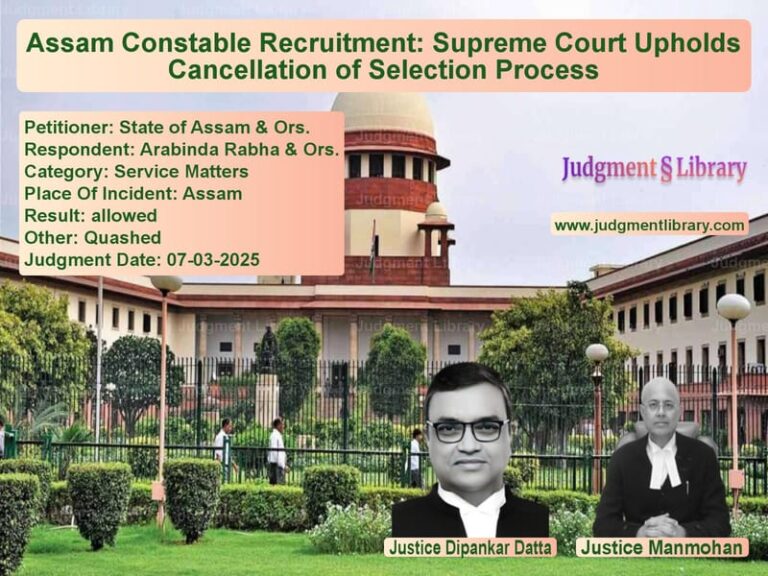Supreme Court Acquits Accused in Dishonoured Cheque Case, Citing Company’s Liability
The Supreme Court of India, in the case of Bijoy Kumar Moni vs. Paresh Manna & Anr., addressed the issue of dishonoured cheques under Section 138 of the Negotiable Instruments Act, 1881 (NI Act). The judgment, delivered by J.B. Pardiwala and R. Mahadevan, upheld the High Court’s decision to acquit the accused on the ground that the cheque was issued on behalf of a company, which was not made a party in the case.
The ruling clarifies the legal position regarding vicarious liability under Section 141 of the NI Act and reiterates that an authorized signatory of a company cannot be held personally liable unless the company is first arraigned as an accused. This judgment has far-reaching implications for corporate transactions and the enforcement of cheque dishonour cases.
Background of the Case
The case revolves around a financial transaction between the appellant, Bijoy Kumar Moni, and the respondent, Paresh Manna. The complainant alleged that:
- In February 2006, the accused borrowed Rs. 7,00,000 from the complainant.
- Subsequently, the accused took an additional Rs. 1,45,000 in cash.
- To repay the debt, the accused issued a cheque dated April 28, 2006 for Rs. 8,45,000, drawn on Standard Chartered Bank.
- The cheque was signed by the accused in his capacity as Director of Shilabati Hospital Pvt. Ltd.
- The cheque bounced due to insufficient funds, leading to the filing of a complaint under Section 138 of the NI Act.
Legal Issues Considered
- Whether the accused could be held personally liable under Section 138 when the cheque was issued on behalf of a company?
- Whether Section 141 of the NI Act, which deals with vicarious liability, applied in this case?
- Whether the High Court was justified in acquitting the accused?
Arguments by the Appellant (Complainant)
The complainant, represented by Advocate Uddyam Mukherjee, argued:
- The transaction was personal between him and the accused, and the company was not involved.
- The accused did not dispute receiving the money.
- Since the accused issued the cheque, he was responsible for ensuring its honouring.
- The High Court wrongly acquitted the accused based on technicalities.
Arguments by the Respondent (Accused)
The accused, represented by Advocate Gaurav Kejriwal, countered:
- The cheque was drawn on an account maintained by Shilabati Hospital Pvt. Ltd., not in his personal capacity.
- Under Section 138, only the drawer of the cheque (i.e., the company) could be held liable.
- Since the company was not made an accused, the case against him was legally not maintainable.
Supreme Court’s Observations
On the Applicability of Section 138
The Court noted:
“The requirement under Section 138 is that the cheque must be drawn on an account maintained by the accused. In this case, the account was maintained by Shilabati Hospital Pvt. Ltd., and not by the accused in his personal capacity.”
On Vicarious Liability under Section 141
The Court ruled:
“A director or authorized signatory of a company can be held vicariously liable only if the company is also prosecuted. Since the company was not arraigned as an accused, the accused cannot be convicted.”
On the High Court’s Acquittal
The Supreme Court upheld the High Court’s reasoning:
“The High Court rightly held that the complainant’s failure to implead the company as an accused rendered the prosecution unsustainable.”
Final Verdict
The Supreme Court dismissed the appeal and upheld the acquittal. Key points:
- The accused was not personally liable under Section 138.
- The cheque was drawn on an account maintained by Shilabati Hospital Pvt. Ltd..
- The complainant’s failure to prosecute the company rendered the case legally defective.
- The accused was acquitted, but the complainant was given the liberty to explore other legal remedies, including filing a cheating case under the Indian Penal Code (IPC).
Impact of the Judgment
This ruling clarifies key principles in cheque dishonour cases:
- Enforcement of Company Law: Individuals signing cheques on behalf of companies cannot be personally prosecuted unless the company is also an accused.
- Precedent for Corporate Cases: This ruling strengthens corporate protections and ensures that directors cannot be unfairly targeted.
- Importance of Correct Legal Procedure: The judgment emphasizes that complainants must follow correct legal procedures when filing cases under Section 138.
By ensuring strict adherence to legal principles, the Supreme Court has reaffirmed the integrity of corporate liability laws and provided clarity on the prosecution of cheque dishonour cases.
Petitioner Name: Bijoy Kumar Moni.Respondent Name: Paresh Manna & Anr..Judgment By: Justice J.B. Pardiwala, Justice R. Mahadevan.Place Of Incident: Kolkata, West Bengal.Judgment Date: 20-12-2024.
Don’t miss out on the full details! Download the complete judgment in PDF format below and gain valuable insights instantly!
Download Judgment: bijoy-kumar-moni-vs-paresh-manna-&-anr.-supreme-court-of-india-judgment-dated-20-12-2024.pdf
Directly Download Judgment: Directly download this Judgment
See all petitions in Cheque Dishonour Cases
See all petitions in Fraud and Forgery
See all petitions in Contract Disputes
See all petitions in Judgment by J.B. Pardiwala
See all petitions in Judgment by R. Mahadevan
See all petitions in dismissed
See all petitions in Quashed
See all petitions in supreme court of India judgments December 2024
See all petitions in 2024 judgments
See all posts in Criminal Cases Category
See all allowed petitions in Criminal Cases Category
See all Dismissed petitions in Criminal Cases Category
See all partially allowed petitions in Criminal Cases Category







